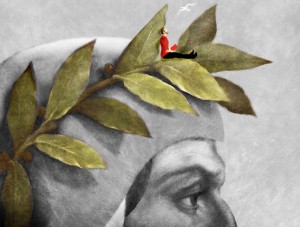Students of CC102 will remember the Divine Comedy as an exciting read, but also as the story of a man much older than most students. Dante deals, in a way, with his midlife crisis.
In The American Conservative, Rob Dreher writes an article about how, at the age of 46, depressed and aimless, he read the Divine Comedy. In Dante’s tale of of psychological crisis, Dreher found a way out of his own depression:
Killing time in a Barnes & Noble one hot south Louisiana afternoon, I opened a copy of Dante’s Inferno, the first of his Divine Comedy trilogy, and read these words (the translation I cite in this essay is by Robert and Jean Hollander):
Midway in the journey of our life
I came to myself in a dark wood,
For the straight way was lost.
I read on in that first canto, or chapter, and stood with Dante the pilgrim as wild beasts—allegories of sin—cut off all routes out of the terrifying wood. Then, to the frightened Dante’s aid, comes the Roman poet Virgil:
‘It is another path that you must follow,’
he answered, when he saw me weeping,
‘if you would flee this wild and savage place.’
So Dante follows Virgil—and I followed Dante. I did not know it in that moment, but those were the first steps of a journey that would lead me through this incomparable 14th-century poem—all 14,233 lines in 100 cantos—through the pits of Hell, up the mountain of Purgatory, beyond space and time to the zenith of Paradise—and out of my own dark wood of depression.
Dreher shares his appreciation for the work:
As my own pilgrimage came to its end last month, I met with my priest and told him that I was free. All the help my counselor had given me, and all the spiritual direction my priest had provided—especially the demanding prayer rule he had imposed—had played their part in my healing. But above all, it was Dante.
How had a medieval Florentine appeared to me in my fear and confusion and led me out of the dark forest and back onto the straight way? It’s not like Dante told me anything I didn’t already know. I am a voracious reader of philosophy and theology but have always been immune to the powers of poetry and fiction. From where does the power of this poem come? Charles Williams answers best: “A thousand preachers have said all that Dante says and left their hearers discontented; why does Dante content? Because an image of profundity is there.”
The Core is mostly filled with bustling, busy youth. This youth is – if all goes according to plan – headed where Dante found himself: confusion, somewhere down the line.
Is there a Core book or piece of art that has helped you over any of life’s hurdles? If not, which works do you think may prove helpful in the future? Let us know in the comments below!

